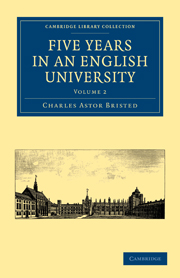Book contents
- Frontmatter
- Contents
- The Cambridge System of Education in its Intellectual Results
- Physical and Social Habits of Cambridge Men.—Their Amusements, &c
- On the State of Morals and Religion in Cambridge
- The Puseyite Disputes in Cambridge, and the Cambridge Camden Society
- Inferiority of our Colleges and Universities in Scholarships
- Supposed counterbalancing Advantages of American Colleges
- The Advantages of Classical Studies, particularly in reference to the Youth of our Country
- What can we, and what ought we, to do for our Colleges
- APPENDIX: Containing Six Exercises for Trinity Declamations, and Three for the Members' Prize
- ERRATA
What can we, and what ought we, to do for our Colleges
Published online by Cambridge University Press: 28 April 2011
- Frontmatter
- Contents
- The Cambridge System of Education in its Intellectual Results
- Physical and Social Habits of Cambridge Men.—Their Amusements, &c
- On the State of Morals and Religion in Cambridge
- The Puseyite Disputes in Cambridge, and the Cambridge Camden Society
- Inferiority of our Colleges and Universities in Scholarships
- Supposed counterbalancing Advantages of American Colleges
- The Advantages of Classical Studies, particularly in reference to the Youth of our Country
- What can we, and what ought we, to do for our Colleges
- APPENDIX: Containing Six Exercises for Trinity Declamations, and Three for the Members' Prize
- ERRATA
Summary
ἐς Τροίαν πειρώμενοι ἤνθον ʾΑχαίοι
Theocritus, Idyll. xv., v. 61.The conclusion of our investigations is that the English system of liberal education possesses some decided advantages over ours; a conclusion from assenting to which the reader need not be prevented by any personal dislike he may feel towards England or Englishmen. Let him profit by the motto of this book, and be wise enough to take a lesson from those whom he does not acknowledge as friends. Still, before we can make any practical use of our result an important inquiry remains. It may be that the peculiar benefits of such an education as an English University affords are dependent on certain political and social conditions peculiar to England, or upon certain antecedents having no counterpart among us. If so, it would be a clear waste of time to suggest any improvements from that quarter. We may be curious about the system or admire it at a distance, but can never rationally hope to imitate it. To seek an impossible combination of advantages is one of the most frequent errors of reformers, and one of the most prolific sources of delusion. Indeed were I asked in what practical wisdom consists, I should not know how to answer better than by defining it as the faculty of discerning things compatible and incompatible—that is, I should enlarge Whately's definition, “a ready perception of analogies,” by the addition, and a ready discrimination of differences.
- Type
- Chapter
- Information
- Five Years in an English University , pp. 150 - 174Publisher: Cambridge University PressPrint publication year: 2010First published in: 1852



